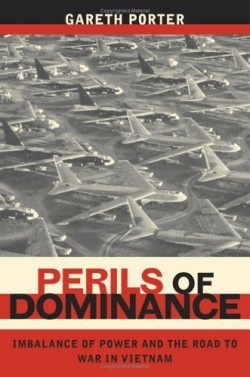Perils of Dominance
The traditional explanation that America was drawn inevitably into the Vietnam quagmire because it was a critical front in the cold war between the United States and the Soviet Union is challenged convincingly in these two important scholarly investigations. Lawrence, a diplomatic historian at the University of Texas, Austin and Porter, an independent scholar and the former co-director of the Indochina Resource Center, describe a war inflamed by reckless and self-serving foreign policy bureaucrats and not by presidents Eisenhower, Kennedy, and Johnson for whom they worked.
Significantly, Lawrence blames French and British policy makers for misleading the United States about Ho Chi Minh, the Vietnamese Communist Party leader, while Porter claims that America’s great military and economic superiority over the USSR and The People’s Republic of China following World War II encouraged policy makers to maintain American dominance through a consistent pattern of lies and distortions about the strength and motivations of these Communist nations. Both authors amplify the pioneering work of Fredrik Logevall, whose 1999 Choosing War framed the war in a global context and demonstrated that America escalated the war despite many readily apparent reasons why doing so would end in failure.
Lawrence examines the complicated legislative dance among France, Great Britain, and the United States beginning in 1943 before the end of World War II. Although France and Great Britain were weakened greatly during the war, they were determined to hold onto their colonial empires, which could help revive their depleted economies. Hoping to gain American sympathy, French foreign policy bureaucrats portrayed Ho Chi Minh as a ruthless Communist bent on subjugating the people of South Vietnam. In addition, in the late 1940s the French installed Bao Dai, a weak, puppet governor in South Vietnam, to serve as a pretend patriotic foil to Ho Chi Minh.
By 1954, when the French-Indochina War concluded with France’s humiliation at Dien Bien Phu, Ho Chi Minh was forced into the Soviet camp because his pleas for Western support were ignored. From 1954 through 1965, Eisenhower, Kennedy, and Johnson foreign policy establishment players strived to create a Vietnam that would serve American interests. They created strategies based on the deceitful French and British ones that set the United States on the path to war.
Porter’s bold revisionist account focuses on American hawkish policy makers who fought Dwight Eisenhower, John Kennedy, and Lyndon Johnson to expand the war, which these presidents did not view as important to American interests. These policy makers ignored the reality that after World War II, the Soviet Union and People’s Republic of China were too weak to challenge America’s vast economic and military superiority. Both Joseph Stalin and Mao Zedong concentrated on their nation’s revitalization and did not want to test the United States over Vietnam.
At the 1954 Geneva Conference, Vietnam was partitioned and elections were called for to elect a national leader by 1956. Secretary of State John Foster Dulles made the decision to ignore the election requirement without telling Eisenhower. Although Kennedy increased significantly the number of advisors in South Vietnam, he did this to fight a guerilla war with the hope that this would avoid a full-scale one. The author reveals that Kennedy maintained secret negotiations with North Vietnam and China and was committed to a complete withdrawal by 1965, positions intolerable to many of his advisors.
Lyndon Johnson, who escalated the war into a long and bloody conflict, was reluctant to fight the war at the expense of his Great Society domestic program. But, as the author grimly shows, LBJ was lied to by Secretary of Defense Robert McNamara, and harassed by the Joint Chiefs of Staff, who clamored for more troops to defeat the enemy. McNamara lied to Johnson about the dubious attacks at the Gulf of Tonkin in 1964, and, along with other members of the foreign policy establishment, fueled speculation that if Vietnam fell so would all of Indochina. The CIA refuted this application of the Domino Theory by showing that Burma, Malaya, and other nations were too strong to be overrun by Communists.
Both authors present important, well-documented inquiries into the roots of this tragic war. They challenge widespread assumptions and offer historical cautions for current United States policymakers who practice diplomacy in a one-superpower world.
Reviewed by
Karl Helicher
Disclosure: This article is not an endorsement, but a review. The publisher of this book provided free copies of the book to have their book reviewed by a professional reviewer. No fee was paid by the publisher for this review. Foreword Reviews only recommends books that we love. Foreword Magazine, Inc. is disclosing this in accordance with the Federal Trade Commission’s 16 CFR, Part 255.

